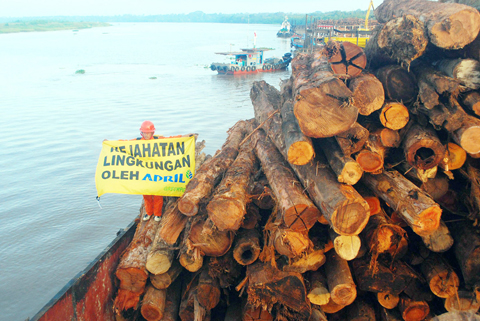Illegal logging of tropical woodland has fallen sharply, providing welcome news in the fight against climate change and a lifeline for a billion poor people who depend on forests for survival, a report released yesterday said.
Since 2000, international efforts to stem the illicit felling of trees has spared some 17 million hectares in three countries alone, amounting to a preserved area larger than England and Wales, the London think tank Chatham House said.
In Brazil, which contains more than a quarter of the planet’s tropical cover, outlaw logging over the last decade dropped by between 50 percent and 75 percent, mainly due to stricter laws and tougher enforcement.

PHOTO: AFP/GREENPEACE
The rate of decline in Indonesia was 75 percent, and in Cameroon pirate logging was cut in half.
But in two other countries covered by the study, the level remained roughly unchanged over the same period.
In Ghana, the problem continues to be endemic, accounting for around two-thirds of overall timber production.
In Malaysia, illegal harvesting still represents 14 percent to 25 percent of total output, the lowest of the five nations under review.
Overall, illegal logging remains a serious challenge. A total of 100 million cubic meters were illegally harvested in these countries alone last year.
The stakes are high, lead author Sam Lawson said.
“Up to a billion of the world’s poorest people are dependent on forests, and reductions in illegal logging are helping to protect their livelihoods,” he said.
The findings also highlight the critical role of forests as a bulkhead against global warming: deviation from “business as usual” has kept at least 1.2 billion tonnes of heat-trapping carbon dioxide from leaking in the atmosphere, he said.
Further efforts on forest preservation are being pursued under the UN Framework Convention on Climate Change.
Loss of forestry accounts for between 12 percent and 20 percent of annual greenhouse-gas emissions. However, illegal logging remains a relatively small part of the problem — conversion of forest land to crops, cattle ranching and urban construction are bigger factors.
Globally, about 130,000km² of mainly tropical forests were lost every year over the last decade, the Food and Agriculture Organization (FAO) said.
The Chatham House study estimates that five consumer nations — the US, Japan, Britain, France and the Netherlands — together purchased 17 million cubic meters of illegal timber in 2008 worth about US$8.4 billion.
Most of the wood entered these countries in the form of furniture and plywood, mainly from China, which has become the largest importer, processor and exporter of illegal timber in the world, according to the study.
Recent legislation in Washington and Brussels may help to curb traffic in illicit tropic woods even further.
In 2008, the US became the first country to prohibit all trade in plants and plant products — furniture, paper, lumber — sourced illegally. The Lacey Act requires importers to indicate exact origin of wood products, and provides for stiff penalties.
The European Parliament this month approved similar legislation, widely hailed by environmental groups as a critical step in the protection of tropical forests.

Archeologists in Peru on Thursday said they found the 5,000-year-old remains of a noblewoman at the sacred city of Caral, revealing the important role played by women in the oldest center of civilization in the Americas. “What has been discovered corresponds to a woman who apparently had elevated status, an elite woman,” archeologist David Palomino said. The mummy was found in Aspero, a sacred site within the city of Caral that was a garbage dump for more than 30 years until becoming an archeological site in the 1990s. Palomino said the carefully preserved remains, dating to 3,000BC, contained skin, part of the

‘WATER WARFARE’: A Pakistani official called India’s suspension of a 65-year-old treaty on the sharing of waters from the Indus River ‘a cowardly, illegal move’ Pakistan yesterday canceled visas for Indian nationals, closed its airspace for all Indian-owned or operated airlines, and suspended all trade with India, including to and from any third country. The retaliatory measures follow India’s decision to suspend visas for Pakistani nationals in the aftermath of a deadly attack by shooters in Kashmir that killed 26 people, mostly tourists. The rare attack on civilians shocked and outraged India and prompted calls for action against their country’s archenemy, Pakistan. New Delhi did not publicly produce evidence connecting the attack to its neighbor, but said it had “cross-border” links to Pakistan. Pakistan denied any connection to

TRUMP EFFECT: The win capped one of the most dramatic turnarounds in Canadian political history after the Conservatives had led the Liberals by more than 20 points Canadian Prime Minister Mark Carney yesterday pledged to win US President Donald Trump’s trade war after winning Canada’s election and leading his Liberal Party to another term in power. Following a campaign dominated by Trump’s tariffs and annexation threats, Carney promised to chart “a new path forward” in a world “fundamentally changed” by a US that is newly hostile to free trade. “We are over the shock of the American betrayal, but we should never forget the lessons,” said Carney, who led the central banks of Canada and the UK before entering politics earlier this year. “We will win this trade war and

Armed with 4,000 eggs and a truckload of sugar and cream, French pastry chefs on Wednesday completed a 121.8m-long strawberry cake that they have claimed is the world’s longest ever made. Youssef El Gatou brought together 20 chefs to make the 1.2 tonne masterpiece that took a week to complete and was set out on tables in an ice rink in the Paris suburb town of Argenteuil for residents to inspect. The effort overtook a 100.48m-long strawberry cake made in the Italian town of San Mauro Torinese in 2019. El Gatou’s cake also used 350kg of strawberries, 150kg of sugar and 415kg of